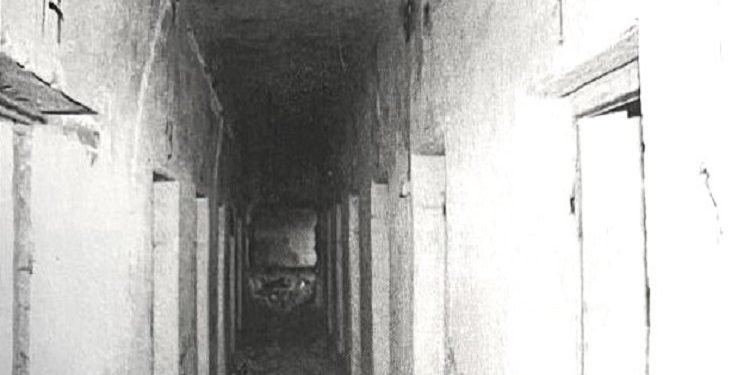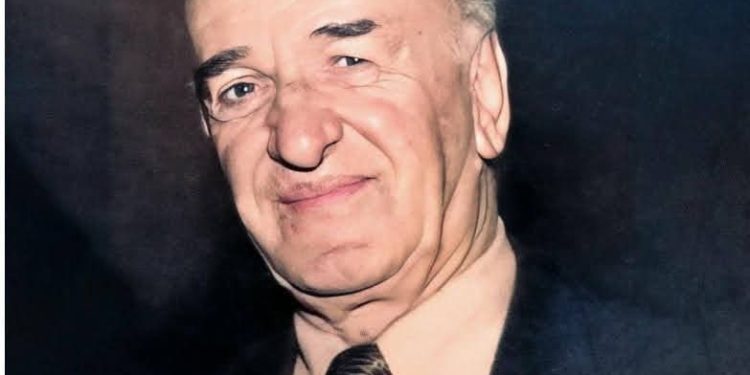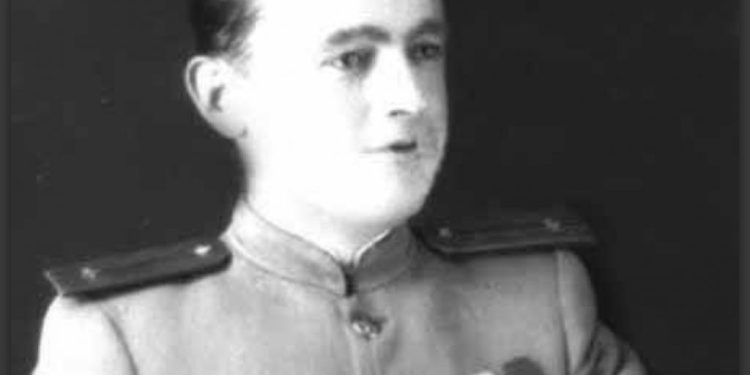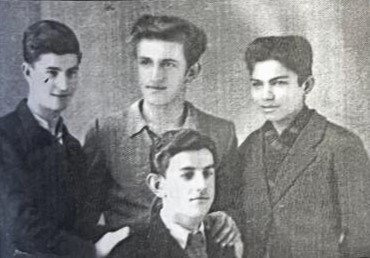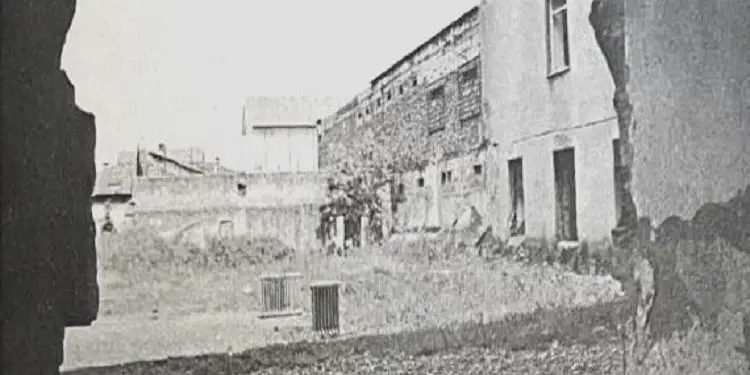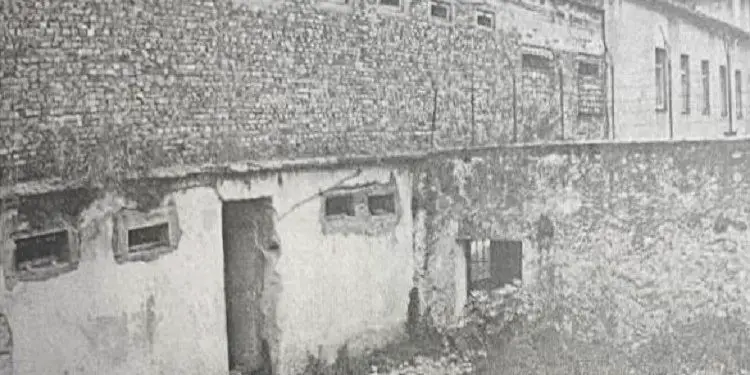By Ahmet Bushati
Part thirty-five
Memorie.al/After the flag was altered in 1944 with the addition of the communist star, Shkodra transformed into a center of resistance against the regime, paying a high price for its tradition of freedom. By April 1945, high school students, already feeling betrayed by the promises of the war, gathered to oppose the new terror that imprisoned and killed innocent people. Communism turned Kosovo into a province of Yugoslavia, while Shkodra was punished for its “historical crime”- its defiance against invaders. The “Postriba Movement” became a tool to suppress all dissent, plunging the city into an unprecedented spiral of suffering: imprisonments, executions, and the destruction of families. The high school students, alongside citizens, became symbols of resistance, while some “young communists” turned into tools of the State Security, leading to expulsions, imprisonments, and internments.
Four times, Shkodra rose in armed rebellion, but history forgot these battles. This book is written to remember the countless prisoners, the tortured, the killed, and the parents who suffered in silence. It is a warning against dictatorship and a plea for future generations not to forget the sacrifices made for freedom.
Continued from the previous issue
In the Footsteps of a Diary
It had been a month since Enver Hoxha had broken with Yugoslavia and the political situation outside could have improved, I would not have known then or for several months afterwards. On the third day, Ali Xhunga met me, as they say, with the first ones. “Did you think about it?” – he asked me, and I, as always, answered: “I have nothing to think about”! He mechanically jumped out of his chair and without speaking, as short as he was and dressed as always militarily, serious and with a determined step, dueled outside in the corridor, from where a policeman entered to guard me. He returned with another soldier, whom I had never seen before and who I would never see again, who on this occasion was holding a power generator.
“Do you see this?” – Ali Xhunga asked me ironically, and continued: “Do you know what it is?” and I answered with “Yes”. “Then I’ll try it again today,” he said, as if nervously. That dry officer twisted the wires of the electric current in my ears, while Ali Xhunga, with a generator in his hands, made me fall several times with force on the floor, foam coming out of my mouth like the other time and my ear, still not healed well, started bleeding again and hurting me even more than the first time. This session, although quite difficult, did not last long. After lunch that same day, Ali Xhunga, Ismail Lulo, and after them “Shurdha”, who was holding a rope and a stool in his hands, were rushed into my dungeon.
When Ismail Lulo pulled the rope from “Shurdha’s” hands, I thought they were going to start hanging me with it. I did not know that “hanging” existed as a form of torture. Deaf, at the command of Ismail Lulo, took out the sleeping clothes, while he himself began the hanging procedure. No one spoke. Ismail Lulo immediately put the chains in my hands, tightening them above my wrists, supported me against the corner of the wall, directly under the window, while he himself climbed onto a stool and, after passing the rope through the chains, tied its two strands together high to the window bars, tightening them to the point that he was completely tense.
Ali Xhunga, who until then had stood speechless and with his hands tied behind his back, seriously watching the execution of his order, would speak only when he was told to come out: “Now you see”! After him, Ismail Lulo also dueled, having left me in only my underwear and a thin silk shirt, torn from the buttons two days before in the investigator’s office. Thus, Ali Xhunga was thinking of realizing with me what he had told me since the first day: “I will not deal with you for long”.
Hanging on a rope with my head bent to the side, constantly with my mouth foaming with saliva and open so that in that hot spot I could take a little breath, with severe pain in the pulses that ran through my entire body, and since the blood circulation in them was not good, they were stiff and had begun to break from the chains that were cutting them like razors; with my eyes constantly closed from great fatigue and long insomnia, this would be more or less my general condition and appearance during those days. It would be only death, on which I had relied for my salvation, the end of those torments that cannot be expressed in words; death, as the only hope with which I would push a mountain of endless hours, during many, many days and nights to come. It would seem to me as if a second person had entered inside me to give me courage, speaking to me: “The more your sufferings increase and the more time passes, the closer you are to death, where you expect to rest”!
At lunchtime they would choose me to eat a piece of bread with a tomato and sometimes two or three figs, which I would either push down with difficulty or not touch at all. In order to tease my weakness, they would often bring the house’s safe, regularly accompanied by some seasonal fruit. They would bring them near the door of the dungeon, so that when they took me to the interrogator, or when I went out to relieve myself, I would look at them with greed.
When they chose me for lunch, I had trouble sitting down, because my legs, which were stretched far above my thighs, were as stiff as two thick blocks of wood that I could not break between the knees. So, to sit down, I would slowly rub my back against the wall, until, unable to continue descending, I would fall on the cement with my legs spread out in front of me.
I didn’t feel like eating at all, but I was very thirsty for water and more than anything, apart from the pain, I needed sleep. At every lunch, as soon as I had barely managed to eat three or four slices of bread, or none at all, I would immediately fall asleep, only to be woken up and hanged by Ismail Lulo, about twenty minutes later. After the first three or four days of being addicted, I was exhausted from sleep as I was and, as always, constantly looking down, I would say to myself over and over again: “Don’t die without sleep once again on this cement”, which I was so eager to see with my eyes day and night.
First they would hang me by my hands, but when, as the days passed, the chains would penetrate my wrists and tear their flesh, they would move the chain between my shoulders, and when after a few more days they would also break from the rope and turn into wounds, they would change places again, but not by grabbing my wrists, which were still living flesh, or as the case may be, even withered with blood and pus inside, but between my arms, and so on, to return as if in reverse order, back to the beginning, even though then and there they would be constantly in a state of wounds.
Only the belief in a quick and certain death gave me the strength to endure. From the pain and insomnia, almost all the time behind, I would pass into a severe hallucinatory state, not knowing for hours, or even days, where I was, and there would come a day when I would no longer consider myself a human being, but an animal. However, in a flash my consciousness would be completely illuminated, as soon as the investigator Ali Xhunga appeared before me, who would try to take advantage of that uncontrolled state of mine.
It would happen to me several times – because I could not get enough breath – that I would be seized by such powerful spasms, my mouth would fill with foam and I would be in such a state that from moment to moment I would expect that my breath would finally be taken away completely. In three cases in particular, I would say that I would have died for sure if they had not intervened in time with medical help. At least in two or three cases, I was conscious enough to vaguely remember the last moments before I fell unconscious, and once, as if in a fog, a man in a white shirt running towards me with a long needle in his hand.
During this period, Ali Xhunga, as if hanging me alone was not enough, would sometimes even lay me on the tree, even though my body was covered in wounds and reeked of a strong stench, just like that of a dead animal. In the future, there would come a time when, when they took me to the W.C., I would walk down the street holding on to the wall with my hands and resting for every step I took, to be followed by another period during which I would be unable to straighten my body, and would walk with my hands on the ground, that is, with my knees and hands on the ground, and to go to the investigator, there would always be two policemen holding my arms and often carrying my weight up the stairs.
For all of the above, we are following a kind of chronology, supported by short passages, to shed light mainly on the work of the investigators of that time, on their wickedness, cruelty and sadism, as well as on the suffering that, like me, many others before me have endured. Ali “the brave” makes even the policemen he called laugh. It seemed that Ali Xhunga had relied on the entire result of his last work with me at the gallows. I am convinced that he had expected my surrender three or four days after I had been hanged, when he would have put me in the dungeon for the first time.
With his hands tied behind his back as always, he would stand for a long time looking at me without speaking, while I, with my head hanging down and never looking at him, struggled to catch my breath, and when I did, foam came out of the side of my mouth. Only when he was about to leave would he cross his hands in front of me, from behind which he had until then, as always with that false pride of his, say to me: “Be careful not to call you at midnight, because then everything will end. We can’t continue with you anymore”!
Investigator Ali Xhunga was very quick to realize that the “death” he was threatening me with was my only hope. As another two or three days passed, somewhere around midnight, two policemen were taking me to investigator Ali Xhunga. I walked through the courtyard between the prison and the Sigurimi building with difficulty and very slowly, being held by the arms of two policemen. I could barely keep up with one step because my legs were very weak and heavy. Then insomnia and a great thirst for water overtook me. I would climb the stairs with even greater difficulty.
When the policemen finally took me into the office, I found Ali Xhunga waiting for me in the front hall, a long table on which – as in an exhibition – he had lined up various instruments of torture, many of which I had never seen before. On his feet as he was, he continued to stand for a while longer without speaking, without moving, thoughtful, and more serious than before. Even the dim light was dimmer than ever, especially so that that gloomy environment would seem to me as frightening and mysterious as possible, and that I, like him, would think about the fate of my life, which that night, from terrible misfortunes, was being endangered more seriously than before.
In fact, the complete opposite of what Ali Xhunga had planned and believed would happen, regarding the effect that his childish measures would have on me. So I felt very offended by what he had thought. How was it possible that that experienced investigator, before treating me like a child, had not been served by my attitude and suffering up to that time? For me, who had been so close to death for several days that I had associated the end of my suffering with it, how was it possible that the sight of those instruments of torture on the table, the dim light and the late hour of the night when he had called me, did not revolt me and ignite a flame?! Was I not a child? An unstoppable wave of anger had frozen me like a corpse in front of his table, not listening to me sit down on the stool, as he had beckoned me, nor when he shouted from behind me in a loud voice: “Sit down, sit down, I say to you”!
I instantly decided to attack him, and without yet uttering a single word from my mouth, I quickly extended my bound hands to grab whatever object I could on the table, but unfortunately, my hands, like two insensitive pieces of swollen flesh, would neither contract nor hold blood! Unable to grasp anything and unable to move even the slightest bit of my legs, I remained in place, and I remained there badly. A despair that no one should experience, overcame me, tormenting me greatly.
But what had happened there? At the moment when I was trying to attack Ali Xhunga, I had uttered words that I had never used in my life, not even sparing those banal “with mother” and “with father”, which had frightened Ali Xhunga from the thought of a prisoner, and had made him fly to the other corner of the table with a portable bell in his hand, from where he would continue to ring it without stopping.
When the two policemen, under the alarming call of the bell, entered the office from the corridor, they would find their superior Ali Xhunga white-faced and with a ridiculous attitude that awaited their help to save him, and always with a bell in his hand. I saw on that occasion how one of the two aforementioned policemen, lowering his head, could not contain a smile until the end, in honor and pity for his poor boss, the anointed one as he was behind his comrade’s back.
Ali Xhunga, – as we have said above – was not a criminal by nature, nor was he brave; on the contrary, he was a coward. He was not one of those who, for the sake of duty, would torture others. No. Consequently, according to me, he was not a sadist like some others there, who did criminal work for passion. His deep nature must have been different. Ali Xhunga must have belonged to that disgusting type of investigator, – like the Field of France once – who had understood in due time that in order to make a career, he had to win the trust of his criminal superiors, for which he, filling every insufficiency of his nature, would torture to the end.
As I have said above, most of the time, due to a severe state of hallucination that had taken possession of me, I spent it with events, scenes and unreal people, which were in fact the product of the fantasy of my sick brain, and that, to many wonders, I had experienced with such intensity those events that were initially and ultimately imaginary, that some of them even today I can reproduce in detail, as if they had really existed. And at the same time, whenever investigator Ali Xhunga appeared before me, my mind would clear up on the spot, perhaps because my fixed idea; “don’t talk to me” and “don’t make a mistake”, acted on me more strongly than the disease itself
Me, the border guard, the horseless carriage and the two Bosniaks!
As a result of my hallucinatory state, one afternoon it dawned on me that right above my bound hands, a border guard had been placed in alpine boots with sharp metal spikes between their soles and heels. I was convinced that I was seeing that border guard with the certainty that a person usually sees a person with the eyes of a fool. As for me, he had the face of a good man, who wore a white hat turned slightly to one side on his head, that he wore cherry-colored trousers and that around the calves of his legs he had rolled up the green “legs” of the soldier, and that also, under them, for elegance, that is, over the heavy shoes that were causing me so much pain, he had turned up the white collars of his wool socks.
I begged him repeatedly to remove them from my hands and take another position, but he, although he was not annoyed by my repeated pleas, like a man of duty that he seemed to be, did not answer me, but smiling without looking at me, he would continue to stand there staring with a long rifle in his eyes. Who knows how many times I would have said: “Aman, go somewhere else and get out of my hands, because you broke them!”
In my attempt to avoid the border guard’s shoes, without knowing what I was doing, I kept moving the rope, which became even more tense as it rubbed against the window sill, and the chains, which in turn tore even more flesh between my wrists, causing me very severe pain. Thus I moved and pulled, moved and pulled without rest, a time would come when, due to the worsening condition in my hands, I would no longer see the “border guard”, but even worse, a large horseless cart, which, by virtue of its several thick and rough wires, seemed to me to be badly entangled in my hands, from which I made the most laborious effort to free myself from them.
I was convinced that I had escaped from prison and that I had found myself on a street in the “Dudas” neighborhood, not far from the house where my friend, Burhan Hoti, lived. It was a hot day and rarely, like behind me, would someone pass by, whom I would ask to help me, saying: “Hey man, get me out of this car that is taking my life and don’t be afraid, because no one will see you, and then I know these streets and I will disappear immediately.”
Thus, after spending hours upon hours in endless attempts to supposedly free myself from the legs of the “border guard” and then from a cart, the rope that was already rubbing against the high window sill had been eaten away, until finally it snapped, and I, not remembering anything, had dropped a piece of it on the cement. Since I was not able to gather my thoughts, neither the broken pulses from the chains that had been inserted into them nor the blood that was flowing took my attention away. Without knowing where I was and without thinking about anything, I instinctively lay down where I had fallen, and fell asleep immediately.
It was Sergeant Mënyri, who, in the morning, before the light had yet dawned, when he first saw me, poking my lip in anticipation of some stupid answer I might have given to one of his questions, would hang me again, but without pulling the rope too much, as the rules required, which Ismail Lulo would correct when he came after him, who would pull it as he knew how. Another day they untied me as usual to eat lunch, – “the lunch of the let them say”, a few bites of bread with a few tomatoes that I had to push down with difficulty after I, rubbing my back against the wall – because of my weak legs – would come down with my legs spread out in front.
One might laugh at the images created by a sick brain of a person like me, who did not take my two thighs for my limbs, but for two people, “two Bosniaks”, “twin brothers”, who were “brown” and “handsome”, “healthy” and well dressed, each with a “black suit” and, on their heads, wearing a “white hat” like snow. The issue for which they had been imprisoned, – as it seemed to me after the conversation that I was having with them, a stone’s throw away from me – was not clear, but as it was after their somewhat reserved explanations, it was confusing. As for me, they remained constantly thoughtful and answered my questions briefly, but with seriousness and respect.
It is worth telling you that during this time, a house behind our W. C.s, a house of spies, there would be a child who, as ordered by his parents, day after day at lunch, for one or two hours in a row, would not stop shouting like a jackal: “Down with the reactionaries”, “Down with the enemies of the people”, “Bullet in the forehead…”! etc. So annoying and unbearable would be those calls of that bad child, torture even more, that they would fall on me like a real hammer on the head and I would suffer it like anyone else. I don’t know who that miserable family was that put such dirty and cruel Sigurimi in the service, to torment its victims even more?! Memorie.al




